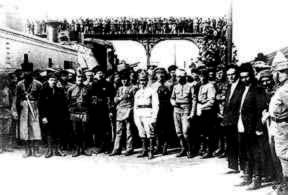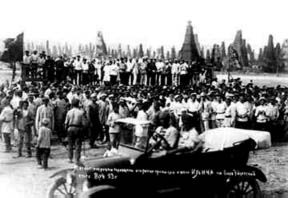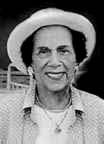
Autumn
1999 (7.3)
When the Bolsheviks
Came
Father's
Intuition - We're Finished!
An Oil Baron's Daughter
Revisits Baku
by
Zuleykha Asadullayeva

 As a young child, Zuleykha
Asadullayeva (1914- ) led a
As a young child, Zuleykha
Asadullayeva (1914- ) led a
privileged life in Baku. Her father and grandfather were very
wealthy, due to their involvement with the region's oil. Zuleykha's
life changed overnight, however, when the Red Army took control
of the city (March 1920). Like so many other people who had wealth,
Zuleykha's family fled their home the very same day.
Photo: Zuleykha Asadullayeva
visiting her childhood home in Baku on Samad Vurgun Street, 79
years later.
During
the Soviet period, the mansion was subdivided into numerous apartments
for generals, professors and judges. It still stands today, housing
several families. Here Zuleykha Khanim, who lives in Washington,
D.C., tells what it was like to return to Baku 79 years later
and walk through the rooms of the home where she grew up.
The interview took place in June 1999 between Zuleykha Khanim
and Azerbaijan International's editor Betty Blair in the living
room of the Iraqi Ambassador's residence, found on the third
floor of what used to be Zuleykha's family's mansion. The Ambassador's
wife graciously invited Zuleykha in and, being new to Baku, was
eager to learn the history of the building. Sadly, none of the
other Azerbaijani apartment owners invited her in.
_____


 It's such a strange
feeling to be here inside the house that I grew up in so many
years ago.
It's such a strange
feeling to be here inside the house that I grew up in so many
years ago.
Photo: Red Army and Bolshevik
leaders shortly after the takeover of Baku, May 1920. Note armored
train at left. Photo: National Archives.
It's the place where my family and
I spent the most precious, carefree, peaceful days of our lives.
So here I am. I don't know whether to feel joyful or sad. I can
neither laugh nor cry. The truth is-the more I see of this place,
the more I hate the former Soviet Union. They took everything
away from my family-everything except for my culture and my language.
Even though I live so far away, I knew that one day I would come
back and see it. It's so painful, though, I'll admit, not to
be allowed into the other apartments to see all the rooms where
I grew up.

 The house
The house  has
been completely changed: instead of one large residence, it has
been split up into separate apartments.
has
been completely changed: instead of one large residence, it has
been split up into separate apartments.
Photo: Anniversary celebration
at Bibi Heybat oil field-one of the first major fields in Baku.
August 1923. Photo: National Archives.
It seems three different families live here now on the three
floors. It used to be that the stairs were made of white marble,
the walls of black marble. There were decorative golden stars
on the stairs-long since removed. Now the beautiful marble is
gone, and the walls that used to have fine murals are painted
a solid color-pink, no less. The entrance hallways look so dirty
and unkempt. It wasn't this way when we lived here.
Early Memories
My grandfather, Shamsi Asadullayev (1840-1913), was a wealthy
oil baron. Born to a poor family, he worked immensely hard to
establish himself in the oil business. When his daughter Aghabaji
Asadullayeva (my mother) got married, he gave her this Rococo-style
mansion as part of her dowry. Grandfather had bought the house
in 1904 from my aunt's father, the oil baron Musa Naghiyev, and
hired an architect from France to work on it. The following year
my family moved in and my oldest sister Maryam Sammadov (her
married name) (1905-1991) was born. My parents had four more
children who also grew up in this house: two sons-Assad (1906-1971)
and Kuduet (1907-1979), another son Samed (1917-1919), and finally
me (1914- ). My family called me Zuliya.
The first floor was the most beautiful. Father's study was there.
In the evenings, he would gather my brothers together for discussions;
he liked to quiz them about their lessons. Mother had the second
floor all to herself, and the children's bedrooms were located
on the third floor. We each had our own room, and all of the
rooms had fireplaces.
My father, Khalef Meylamov, was very strict. He always insisted
that we be well-disciplined children, despite the fact that we
liked to play mischievous tricks. One time we even poured ink
down from the balcony! As punishment we were made to stand in
the corner until we had learned our lesson. Or sometimes when
we were bad, we didn't get dessert.
In the evenings, we would play music for our parents. My sister
and I played the piano, while my older brother played the violin,
and my other brother the cello. Our music teacher was a Jewish
woman who lived close by.
We received a Russian education. None of our books were in Azeri.
We learned Russian, French, English and German, with a different
governess for each language. They used to live with us. To tell
you the truth, I never liked the German Fraulein; she was such
a strict woman. We also had a religious teacher, Mirza Akhund,
who taught us about Islam. He was a highly educated person.
Our mother employed 18 Russian maids and a Lezghi cook. (Lezghi
is one of the ethnic groups that live in Azerbaijan.) Despite
all the help my mother had, she never allowed us to order the
servants around. We were taught to address them politely, always
prefacing our requests with "Please". I remember at
Christmas time, we would dance around the Christmas tree and
sing songs in German like "O Tanenbaum".
About every three months or so, we would go to Europe or out
to our country house in Mardakan down by the sea where my uncles
would drop in for a cup of tea in the evenings.
My mother, Aghabaji Asadullayev, was really a very nice person.
She was the last one to get married in her family. Her father,
Shamsi Asadullayev, was quite modern-in a European sort of way.
He never allowed his daughters to wear a chadra (veil) except
when they visited the cemetery. Actually, there were a lot of
women living in the center of Baku who also didn't wear the chador-though
most did in the Old Inner City (Ichari Shahar). Instead, Grandfather
would buy his daughters beautiful hats from Paris. At that time
Sheikh Islami, the religious leader in Baku, told him that people
might grab the hats off his daughters to embarrass them. My grandfather
had replied, "I'd like to see the man who would dare touch
my daughters' hats."
Revolution
Life was privileged and happy for us. But then tragedy struck.
In 1918 there was a barbaric raid by the Armenian Dashnaks led
by Shaumian and Mikoyan. They looted the city and in the course
of 13 days, slaughtered thousands of Azerbaijanis. At that time,
we left Baku for Turkmenistan, where my father had cotton plantations
and a big factory in Kizil Arvat. Later on, the Ottoman (Turkish)
army occupied Baku and we returned home. Life went along beautifully.
I was six years old when the Red Army entered Baku. I still remember
it as if it were yesterday. Actually few people knew that the
Red Army was coming; everyone thought it would be the Turkish
army. That's what the government said. Now reflecting back, it's
clear that Mammad Amin Rasulzade and the other government leaders
did not want everyone to panic. Parliament met for three days
deliberating whether they should surrender to the Soviets or
not. Finally, they did, after being promised that the Bolsheviks
would harm no one and not destroy any property. What poor judment
to have trusted them!
I'll never forget the scene in Baku's streets: it was April 23,
1920. My mother and father stood in the dining room looking out
the window, watching the scene unfold. The streets were full
of rough, dirty Red Army soldiers. My father turned and looked
sadly at my mother. "We're finished," he said. Truer
words were never spoken.
We organized to leave home immediately. By 6 o'clock that afternoon,
two coaches stopped by the house and whisked us away to a friend's
home in the building that now houses the offices of SOCAR (State
Oil Company of Azerbaijan Republic). We stayed there for a week,
then left for our family's summer house. The Soviets would later
confiscate our country house down by the sea in Mardakan and
convert it into a resort. At least the gate still bears witness
to its original owners. The sign reads, "Country House of
the Asadullayevs."
Our family was soon separated. Both my parents were arrested.
My mother was eventually released, but my father was imprisoned
for a year, by order of the Committee of Extraordinary Affairs.
They were executing 50 people every day. I don't quite know how
he managed to stay alive. I think my mother bribed the officials
with some of her jewelry to get him released. But again they
arrested him. In the end, my father was probably executed. We
don't know what happened to him. He never got the chance to leave
Azerbaijan with the rest of his family.
Fleeing to Turkey
Eventually, preparations were made for us to go to Turkey with
the assistance of the Turkish Ambassador from Moscow. The authorities-those
who comprised what is known as the "26 Commissars"-encouraged
us to leave. In retrospect, we think it was because they knew
my mother would be trying to take her jewelry out with her. And
so in 1922 as we were getting ready to leave Baku by train for
Batum [Georgia], they separated us children from Mother and threatened
her that if she didn't give them all her diamonds, they would
kill her children. And so Mother parted with her 20 boxes of
silver jewelry and 120 karats' worth of diamonds.
Of course, those robbers rationalized their own crime by alleging
that all those jewels were bought with the blood of labor. But
they would not concede that my father and my grandfather had
been laborers, too. They had become wealthy by working. I remember
how every morning at 8 a.m. my grandfather used to go to the
oil fields in Surakhani and Balakhani. He had started out as
a wheelbarrow driver transporting crude oil from the oil fields
to the refineries. He was 18 years old when he started his own
business in oil and eventually amassed 40 derricks, which produced
more than 6 million barrels of oil per year. He also owned several
oil tankers, pipelines and a refinery. His wealth and reputation
extended from Iran, up through Russia along the Volga River to
Lodz, Poland.
So in 1922, we left for Istanbul. We lived there at the mercy
of the Turkish people-Ataturk himself provided us with everything
we needed until my brothers arrived. Luckily, my family still
had some money through their dealings with the Standard Oil Company.
It's an understatement to say that my mother, left alone with
no husband, all these problems and three kids, suffered immense
mental anguish. It wasn't an easy life for her. She was a fine
woman. She was very patient and never spoke evil about Azerbaijan.
She died in Turkey due to kidney problems when she was only 46
years old.
My sister Maryam stayed behind in Azerbaijan. She was married
at the time and couldn't leave her husband and his family. She
suffered immensely. She was made to live in a tiny apartment.
Later she told me that people had spit in her face. For the longest
time, she had no job-nobody wanted to hire her. Finally, she
decided to go to Moscow and complain to Prime Minister Kalinini.
She told him that it wasn't her fault that she happened to be
the granddaughter of Shamsi Asadullayev. "I have no work,"
she told him. "I'm hungry. So either let me leave the country
and go to Turkey, or give me a job." He gave her a job,
teaching in Baku.
Later, when she applied for a visa to visit her family in Turkey,
the authorities wouldn't let her leave the country. I didn't
see her again until 1991-70 years later! She cried a lot when
she saw me, but to tell you the truth, I felt little emotion.
Even though we were sisters, she seemed like a stranger to me.
She died shortly afterwards that year.
I grew up in Turkey, went to university there, and eventually
married an American, Gordon Baker, who was building a hydraulic
plant there. We went to the U.S., where I became a high school
history and geography teacher. I was very happy there and was
received with open arms. Unfortunately, my husband died seven
years after we got married. Then I met up with one of my brothers
who was living in Brazil and taught there for four years. I'm
retired now.
So now how do I feel about being back in Baku? Well, this is
my sixth trip back since Azerbaijan's independence. I don't regret
having had to leave my Motherland. In Turkey, I was treated very
well, I received a fine education. I lived a good life and, most
importantly, I had freedom. In regard to Azerbaijan today, I
have great respect for this country and its President. I think
Heydar Aliyev will go down in history as one of the greatest
statesmen of the 20th century.

 About our family's wealth-well,
it's gone. I don't really care that
About our family's wealth-well,
it's gone. I don't really care that
it's gone. Let it be gone. Money is not happiness; happiness
comes from relationships with others, and in what we can do for
others, especially when they're in need.
Zuleykha
Asadullayeva in Baku in June 1999. She lives in Washington, D.C.
Her childhood home is in Baku and located on what today is called
Samad Vurgun Street.
Home
| About
Azeri | Learn
Azeri | Arabic
Script | Store | Contact
us
Articles from Azerbaijan
International
© Azerbaijan International. Copyright 2002. All rights reserved.
|
|